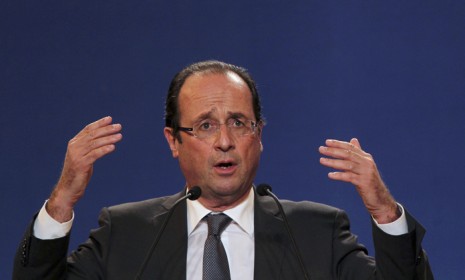Will anti-austerity voters kill the euro?
The French presidential election and the collapse of the Dutch government indicate that the ballot box is pushing Europe to a decisive turning point

A free daily email with the biggest news stories of the day – and the best features from TheWeek.com
You are now subscribed
Your newsletter sign-up was successful
The European public is fed up with austerity. That's the message that is caroming across the continent, as voters express their displeasure with sharp spending cuts that are meant to resolve Europe's debt crisis, but invariably lead to job losses and slow economic growth. Francois Hollande, who has called for less austerity and a greater focus on growth, is in the lead in France's presidential election. The Dutch government, which has been solidly pro-austerity throughout the crisis, collapsed over a right-wing party's objections to austerity in its latest budget. Greece is set to hold elections in early May, and it's doubtful the new government will be able to overcome fierce public opposition to maintain its austerity commitments. Accompanying this sea change are fresh doubts that Europe's economic union can survive. Will anti-austerity movements kill the euro?
The currency bloc looks increasingly fragile: In Europe, "there is no longer a substantial majority willing to make the sacrifices needed to keep the euro currency system together," says Michael Sivy at TIME. In countries that are financially weak, "popular resistance to austerity policies is mounting." Meanwhile, financially stable countries like Germany are facing an electorate that is "growing increasingly unwilling to keep doling out money to keep the weaker countries from insolvency." And "as popular support for the euro diminishes across the political spectrum, governments will be less willing to take the aggressive and sometimes painful measures needed to keep the eurozone together."
"Democracy could destroy the euro"
The Week
Escape your echo chamber. Get the facts behind the news, plus analysis from multiple perspectives.

Sign up for The Week's Free Newsletters
From our morning news briefing to a weekly Good News Newsletter, get the best of The Week delivered directly to your inbox.
From our morning news briefing to a weekly Good News Newsletter, get the best of The Week delivered directly to your inbox.
German voters might still compromise: Germany, the primary champion of austerity, must now realize that strict austerity is failing "both pragmatically and politically," says Andrew Moravcsik at The New York Times. Economic pain in Spain and Greece shows that "economies without growth cannot support" draconian efforts to close budget deficits. Pressure is building on Germany to compromise and adjust European fiscal treaties to allow for more domestic spending. How it responds "will shape not just the fate of the single currency but also future of the whole continent."
Europe is forging into unknown territory: "A reckoning with Germany's insistence on lock-step austerity" has begun, says Nicholas Kulish at The New York Times. But "while there is a growing consensus on the need for new growth policies, it is far from obvious what those policies should be." Countries deep in red ink will find it particularly difficult to borrow money to enact stimulus-like programs. Europe may have to take some creative and unprecedented measures, including creating a Eurobond, a pan-European debt instrument that Germany "has opposed forcefully."
"Call for growth to counter German push for austerity"
A free daily email with the biggest news stories of the day – and the best features from TheWeek.com
-
 6 of the world’s most accessible destinations
6 of the world’s most accessible destinationsThe Week Recommends Experience all of Berlin, Singapore and Sydney
-
 How the FCC’s ‘equal time’ rule works
How the FCC’s ‘equal time’ rule worksIn the Spotlight The law is at the heart of the Colbert-CBS conflict
-
 What is the endgame in the DHS shutdown?
What is the endgame in the DHS shutdown?Today’s Big Question Democrats want to rein in ICE’s immigration crackdown